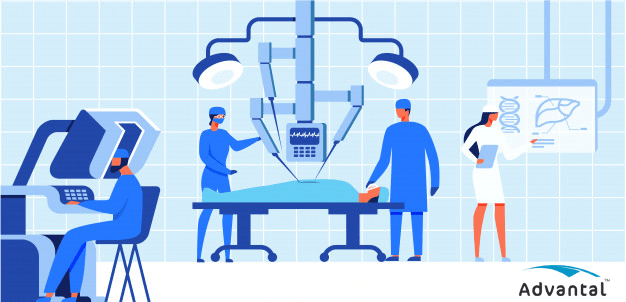We all have been experiencing an unbelievable digital transformation in our lives with increasing technologies, and devices powered by artificial intelligence. Smartphones, smart TV, smart home devices, and corporate gadgets are trying to manipulate lives and behaviours so effectively that no one can imagine having a day without their smart gadgets.
As AI is getting more accurate to deal with human tasks, more and more industries are adopting artificial intelligence and robotics for better functionality and results. Healthcare is one such area where AI & Machine Learning has become among the most revolutionary ideas.
How Artificial Intelligence Works?
If you still think of Artificial Intelligence as some robots with self-driving cars, then you need to get rid of this misconception before getting into AI’s major practical tasks. AI is simply based on predictive analysis and language processing across devices, making human tasks easier. AI technology allows devices to process the data and make decisions that are based on predictions.
The earlier AI approach combined smart research systems and computers having intelligent assistants such as Siri, Alexa or Cortana, etc.
Today, things have gone beyond just taking instructions and completing the tasks. This is the reason why I am going to discuss how modern AI can transform the examination and healthcare access around the world?
Early Detection
The most important concern in the healthcare sector is to create a diagnose system that is accurate to detect early symptoms of major diseases. Errors in diagnoses have contributed around 10% of deaths. No matter how big the reputation of a health care provider is or how amazing equipment they have, human minds make errors every now and then.
AI, on the other hand, can improve the accuracy and success rate while analyzing symptoms at early stages. Moreover, early-stage detection enables health care professionals to provide better monitoring and preventive care than measuring after conditions have gotten worse.
Medical Devices Are Getting Smarter
Apart from the medical team offering real-time aid to patients, medical equipment needs to get smarter for managing critical cases. Using AI in healthcare devices can enhance the ability to treat major conditions with better outcomes. The potential technology can process data from different healthcare devices and create alerts to provide real-time patient care and reduce the burden from doctors.
Recently, robots and artificial intelligence assistants are being used in surgeries, instrumental guidance and more.
Remote Monitoring Getting Easier
Recently, I read an article about how a California based healthcare centre has been providing medical services related to bone alignment to more than 57,000 members. They have started as an AI-based command centre that analyzed data from a monitoring kit having blood pressure cuff, connected medical devices, and data collection table to coordinate for remote motoring with its members.
This monitoring kit offers reports, prescriptions, and treatment options to the command centre, and then they proceed further with the report. Thus, remote monitoring has brought a lot of potential for the health industry so that the population in urban areas gets access to regular health care via seminars and governmental campaigns for better medical facilities.
Virtual Nursing Assistants
In case of critical medical emergencies, nursing assistance is highly recommended by the experts, but it has evolved over a few years. Just like Siri and Alexa becoming your daily assistants, AI has made it possible to get virtual nursing assistants to help patients get better.
They will remind you to take medications on time, go for routine check-ups, and answer monitoring questions for further treatment. This not only makes health care better but reduces hospital visits, readmissions, and burden from the doctors.
Streamlining Workflow
If you are someone who has been working to make healthcare better, then you already know how patient care gets affected because of mismanagement and increasing administrative tasks. The job gets preoccupied with other time-consuming tasks, such as analytical data entry, unnecessary medical presentations and more. More than 80% of doctors feel that they are unnecessarily involved in other tasks rather than providing healthcare to patients.
To eliminate such workflow hazards, EHR is being welcomed around the world to ensure data management and workflows are being handled properly. Also, intelligent dictation and automatic clinical records, using AI will be able to collect and reuse the data whenever required.
Well, there is no doubt about how effectively the usability of AI in healthcare has been increasing, but to find the best technology, you need an expert team that is well-versed with the requirements of a specific sector. At Advantal Technologies, we are regularly working on technologies that can help the industries go faster than ever before.

